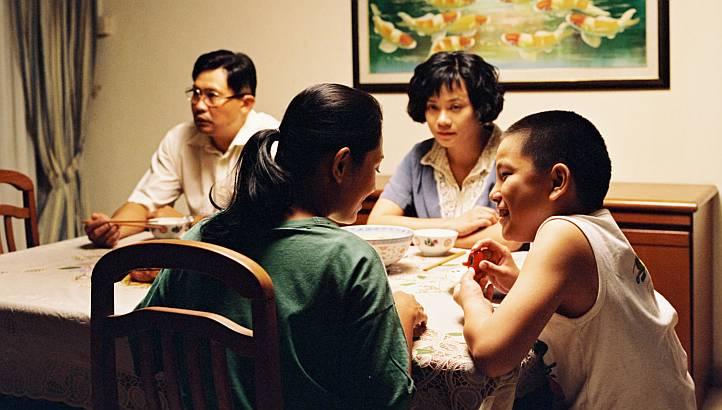Dir: Anthony Chen
By: Oliver Thom
 “With a view so nice it’s no wonder so many people come here to jump”.
“With a view so nice it’s no wonder so many people come here to jump”.
A sentimental portrait of domestic Singapore, Ilo Ilo is the semi-autobiographical feature debut of director Anthony Chen (and recipient of the 2013 Cannes Film Festival’s Camera d’Or). Ilo Ilo is a sympathetic and intimate story of the sometimes painful, sometimes sweet experiences of a middle class family and their new Filipina housemaid, “Auntie Terry”.
Set in a Singapore waking up to the financial crisis of the late 1990’s, the film is a close copy of Chen’s own childhood experiences of the domestic arrangements that many families opt into – where hiring domestic help is seen as a common economic practicality rather than any suggestion of status.
It’s for that same reason that nine-year-old Jiale is stuck with new housemaid Teresa by matriarchal tiger mom Leng (expecting her second child) and chain-smoker-in-secret dad Teck (a glass salesman whose latest unbreakable tempered glass always find a way to break). The family has lost a nominal nanny in their recently deceased grandfather and Jiale, exploiting his parent’s absenteeism, is something like a little emperor – bratty, entitled and left (agonisingly) unpunished by his busy parents.
Arriving from the Philippines, Teresa has her passport taken and is given a bundle of hand-me-downs to wear. She sleeps on a camp-bed in Jiale’s room. She is there to support her own child (like many of Singapore’s housemaids with families in Malaysia or Indonesia or The Philippines) and there is something of a Stockholm syndrome atmosphere to the way Teresa and Jiale’s relationship slowly improves throughout the film. For Teresa, the breakthrough is hard-earned – she becomes an unwilling confidante to each of the families best kept secrets while keeping some of her own.
And as Teresa and Jiale begin to bond, the morale within the family begins to wane. Their new relationship develops at the expense of Leng, who sees Teresa become Jiale’s new mother (She is wearing her hand-me-down dresses and even her lipstick). She dispenses rampant animosity in return. At Jiale’s birthday, she watches as the family play with a box of pet chicks – she eats her chicken out of a bucket Kentucky fried.
Ilo Ilo’s resolution is bittersweet, and where the film succeeds is in its smaller moments – it shuns big dramatics in place of subtle emotional sucker punches. There is empathy for each of the cast and Ilo Ilo does well not to change its characters but only our opinions of them – Chen gives each a vulnerability and sympathy that is heartfelt and understandable. The film is subdued but retains a sense of optimism, and as each character expands there is a rich pulp of detail for the audience to feed off thanks to some disarmingly natural performances from its principal cast.
You get the impression that the real world of Ilo Ilo, its tiger moms and little emperors and migrant housemaids is so commonplace in Singapore that it has hitherto appeared drama-less. It is a banality that the film does not shy away from, but Chen has found something of life in the little stories and of the routine of family that is worth keeping.
Ilo Ilo, winner of the the Camera d’Or at the 2013 Cannes Film Festival is now playing at the ICA until the 15th May.
Discover more fantastic Asian films to stream at Filmdoo






Ah! I missed out big part in my life. Living in Singapore but couldn’t manage to watch this.